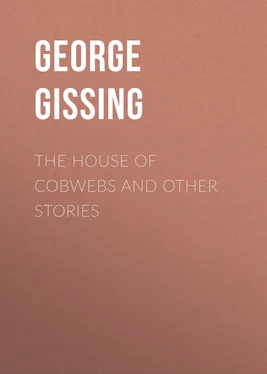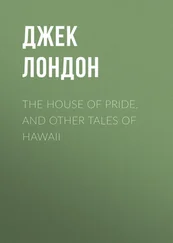George Gissing - The House of Cobwebs and Other Stories
Здесь есть возможность читать онлайн «George Gissing - The House of Cobwebs and Other Stories» — ознакомительный отрывок электронной книги совершенно бесплатно, а после прочтения отрывка купить полную версию. В некоторых случаях можно слушать аудио, скачать через торрент в формате fb2 и присутствует краткое содержание. Жанр: foreign_prose, literature_19, foreign_antique, на английском языке. Описание произведения, (предисловие) а так же отзывы посетителей доступны на портале библиотеки ЛибКат.
- Название:The House of Cobwebs and Other Stories
- Автор:
- Жанр:
- Год:неизвестен
- ISBN:нет данных
- Рейтинг книги:5 / 5. Голосов: 1
-
Избранное:Добавить в избранное
- Отзывы:
-
Ваша оценка:
- 100
- 1
- 2
- 3
- 4
- 5
The House of Cobwebs and Other Stories: краткое содержание, описание и аннотация
Предлагаем к чтению аннотацию, описание, краткое содержание или предисловие (зависит от того, что написал сам автор книги «The House of Cobwebs and Other Stories»). Если вы не нашли необходимую информацию о книге — напишите в комментариях, мы постараемся отыскать её.
The House of Cobwebs and Other Stories — читать онлайн ознакомительный отрывок
Ниже представлен текст книги, разбитый по страницам. Система сохранения места последней прочитанной страницы, позволяет с удобством читать онлайн бесплатно книгу «The House of Cobwebs and Other Stories», без необходимости каждый раз заново искать на чём Вы остановились. Поставьте закладку, и сможете в любой момент перейти на страницу, на которой закончили чтение.
Интервал:
Закладка:
To the Ercles vein of these Titans of fiction, Gissing was a complete stranger. To the pale and fastidious recluse and anchorite, their tone of genial remonstrance with the world and its ways was totally alien. He knew nothing of the world to start with beyond the den of the student. His second book, as he himself described it in the preface to a second edition, was the work of a very young man who dealt in a romantic spirit with the gloomier facts of life. Its title, The Unclassed, 3 3 Three vols., 1884, dedicated to M.C.R. In one volume 'revised,' 1895 (preface dated October 1895).
excited a little curiosity, but the author was careful to explain that he had not in view the déclassés but rather those persons who live in a limbo external to society, and refuse the statistic badge. The central figure Osmond Waymark is of course Gissing himself. Like his creator, raving at intervals under the vile restraints of Philistine surroundings and with no money for dissipation, Osmond gives up teaching to pursue the literary vocation. A girl named Ida Starr idealises him, and is helped thereby to a purer life. In the four years' interval between this somewhat hurried work and his still earlier attempt the young author seems to have gone through a bewildering change of employments. We hear of a clerkship in Liverpool, a searing experience in America (described with but little deviation in New Grub Street ), a gas-fitting episode in Boston, private tutorships, and cramming engagements in 'the poisonous air of working London.' Internal evidence alone is quite sufficient to indicate that the man out of whose brain such bitter experiences of the educated poor were wrung had learnt in suffering what he taught—in his novels. His start in literature was made under conditions that might have appalled the bravest, and for years his steps were dogged by hunger and many-shaped hardships. He lived in cellars and garrets. 'Many a time,' he writes, 'seated in just such a garret (as that in the frontispiece to Little Dorrit ) I saw the sunshine flood the table in front of me, and the thought of that book rose up before me.' He ate his meals in places that would have offered a way-wearied tramp occasion for criticism. 'His breakfast consisted often of a slice of bread and a drink of water. Four and sixpence a week paid for his lodging. A meal that cost more than sixpence was a feast.' Once he tells us with a thrill of reminiscent ecstasy how he found sixpence in the street! The ordinary comforts of modern life were unattainable luxuries. Once when a newly posted notice in the lavatory at the British Museum warned readers that the basins were to be used (in official phrase) 'for casual ablutions only,' he was abashed at the thought of his own complete dependence upon the facilities of the place. Justly might the author call this a tragi-comical incident. Often in happier times he had brooding memories of the familiar old horrors—the foggy and gas-lit labyrinth of Soho—shop windows containing puddings and pies kept hot by steam rising through perforated metal—a young novelist of 'two-and-twenty or thereabouts' standing before the display, raging with hunger, unable to purchase even one pennyworth of food. And this is no fancy picture, 4 4 Who but Gissing could describe a heroine as exhibiting in her countenance 'habitual nourishment on good and plenteous food'?
but a true story of what Gissing had sufficient elasticity of humour to call 'a pretty stern apprenticeship.' The sense of it enables us to understand to the full that semi-ironical and bitter, yet not wholly unamused passage, in Ryecroft :—
'Is there at this moment any boy of twenty, fairly educated, but without means, without help, with nothing but the glow in his brain and steadfast courage in his heart, who sits in a London garret and writes for dear life? There must be, I suppose; yet all that I have read and heard of late years about young writers, shows them in a very different aspect. No garretteers, these novelists and journalists awaiting their promotion. They eat—and entertain their critics—at fashionable restaurants, they are seen in expensive seats at the theatre; they inhabit handsome flats—photographed for an illustrated paper on the first excuse. At the worst, they belong to a reputable club, and have garments which permit them to attend a garden party or an evening "at home" without attracting unpleasant notice. Many biographical sketches have I read during the last decade, making personal introduction of young Mr. This or young Miss That, whose book was—as the sweet language of the day will have it—"booming"; but never one in which there was a hint of stern struggles, of the pinched stomach and frozen fingers.'
In his later years it was customary for him to inquire of a new author 'Has he starved'? He need have been under no apprehension. There is still a God's plenty of attics in Grub Street, tenanted by genuine artists, idealists and poets, amply sufficient to justify the lamentable conclusion of old Anthony à Wood in his life of George Peele. 'For so it is and always hath been, that most poets die poor, and consequently obscurely, and a hard matter it is to trace them to their graves.' Amid all these miseries, Gissing upheld his ideal. During 1886-7 he began really to write and the first great advance is shown in Isabel Clarendon . 5 5 Isabel Clarendon . By George Gissing. In two volumes, 1886 (Chapman and Hall). In reviewing this work the Academy expressed astonishment at the mature style of the writer—of whom it admitted it had not yet come across the name.
No book, perhaps, that he ever wrote is so rich as this in autobiographical indices. In the melancholy Kingcote we get more than a passing phase or a momentary glimpse at one side of the young author. A long succession of Kingcote's traits are obvious self-revelations. At the beginning he symbolically prefers the old road with the crumbling sign-post, to the new. Kingcote is a literary sensitive. The most ordinary transaction with uneducated ('that is uncivilised') people made him uncomfortable. Mean and hateful people by their suggestions made life hideous. He lacks the courage of the ordinary man. Though under thirty he is abashed by youth. He is sentimental and hungry for feminine sympathy, yet he realises that the woman who may with safety be taken in marriage by a poor man, given to intellectual pursuits, is extremely difficult of discovery. Consequently he lives in solitude; he is tyrannised by moods, dominated by temperament. His intellect is in abeyance. He shuns the present—the historical past seems alone to concern him. Yet he abjures his own past. The ghost of his former self affected him with horror. Identity even he denies. 'How can one be responsible for the thoughts and acts of the being who bore his name years ago?' He has no consciousness of his youth—no sympathy with children. In him is to be discerned 'his father's intellectual and emotional qualities, together with a certain stiffness of moral attitude derived from his mother.' He reveals already a wonderful palate for pure literary flavour. His prejudices are intense, their character being determined by the refinement and idealism of his nature. All this is profoundly significant, knowing as we do that this was produced when Gissing's worldly prosperity was at its nadir. He was living at the time, like his own Harold Biffen, in absolute solitude, a frequenter of pawnbroker's shops and a stern connoisseur of pure dripping, pease pudding ('magnificent pennyworths at a shop in Cleveland Street, of a very rich quality indeed'), faggots and saveloys. The stamp of affluence in those days was the possession of a basin. The rich man thus secured the gravy which the poor man, who relied on a paper wrapper for his pease pudding, had to give away. The image recurred to his mind when, in later days, he discussed champagne vintages with his publisher, or was consulted as to the management of butlers by the wife of a popular prelate. With what a sincere recollection of this time he enjoins his readers (after Dr. Johnson) to abstain from Poverty. 'Poverty is the great secluder.' 'London is a wilderness abounding in anchorites.' Gissing was sustained amid all these miseries by two passionate idealisms, one of the intellect, the other of the emotions. The first was ancient Greece and Rome—and he incarnated this passion in the picturesque figure of Julian Casti (in The Unclassed ), toiling hard to purchase a Gibbon, savouring its grand epic roll, converting its driest detail into poetry by means of his enthusiasm, and selecting Stilicho as a hero of drama or romance (a premonition here of Veranilda ). The second or heart's idol was Charles Dickens—Dickens as writer, Dickens as the hero of a past England, Dickens as humorist, Dickens as leader of men, above all, Dickens as friend of the poor, the outcast, the pale little sempstress and the downtrodden Smike.
Интервал:
Закладка:
Похожие книги на «The House of Cobwebs and Other Stories»
Представляем Вашему вниманию похожие книги на «The House of Cobwebs and Other Stories» списком для выбора. Мы отобрали схожую по названию и смыслу литературу в надежде предоставить читателям больше вариантов отыскать новые, интересные, ещё непрочитанные произведения.
Обсуждение, отзывы о книге «The House of Cobwebs and Other Stories» и просто собственные мнения читателей. Оставьте ваши комментарии, напишите, что Вы думаете о произведении, его смысле или главных героях. Укажите что конкретно понравилось, а что нет, и почему Вы так считаете.












